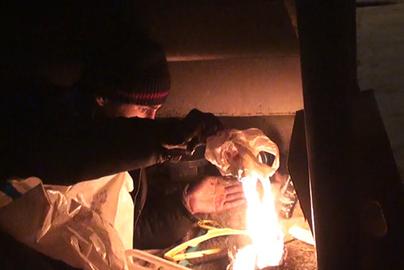Hossein Rezvani, citizen journalist
There are between 10,000 and 12,000 homeless people in Tehran, according to the office of the city’s mayor. They are often called “card-boarders” because they take shelter in cardboard boxes. Reports say that more than 80 per cent of them are drug addicts.
Every winter, when the temperatures plummet, a number of card-boarders die of frostbite. In 2010, in one of the coldest winters on record, 22 lost their lives. The following year, nine people died.
It was in 2004, after a very cold winter, that the media first reported the mortality rate among the homeless in Tehran, which created a stir. Following reports, various government institutions, including the State Welfare Organization and Tehran’s city government, began providing “warm shelters” for homeless people on cold winter nights.
The number of these shelters in Tehran has now reached 17, with facilities to accommodate about 2,000 people. In addition, charity organizations and NGOs patrol the city on freezing nights and transfer card-boarders to shelters, which provide them with beds and hot meals. Nevertheless, there are homeless people who do not take advantage of these services and spend nights under bridges or inside derelict buildings.
Under the Bridge
Mohammad is 26 and has been homeless for four months. He started sleeping on the streets at the beginning of winter, when the temperature dropped to minus seven degrees centigrade, a record for that time of year. In spite of the cold, he spent his days and nights under a bridge and survived.
Mohammad, who left education following primary school, is addicted to heroin. Ten years ago, he started smoking cigarettes and a few years ago, he became addicted to heroin. “I’ve tried everything,” he says.
He has chosen to live in cardboard boxes, he says, because he is fed up with having endless quarrels with his family. “My family could not live with me smoking,” he explains, “let alone with me using drugs. So I became a card-boarder.”
On cold nights, he has his own way of keeping warm, using disposable aluminum containers and a large number of plastic bags that he gathers from garbage cans around Tehran. By setting fire to the plastic bags inside an aluminum container, he creates a long-lasting – but extremely foul and smoky – fire to warm his hands.
Mohammad says that he knows many card-boarders in Tehran, men and women who live under bridges and overpasses or around autobahns or parks. The homeless, he says, are made up of a few groups, including addicts who have spent every last penny they have on drugs, or are broke and have no other recourse apart from living on the streets.
The second group is made up of young people from the provinces who have come to Tehran in search of a job or to escape their families, but have become card-boarders because they could not find a job and did not know anyone.
The third group consists of natives Tehranis who have never had anybody in their lives. According to Mohammad, members of this group have spent various phases of their lives in a range of places, from orphanages to the streets to prisons.
Tehran is an expensive place to live. Although people like Mohammad do not pay rent and do not have many expenses apart from buying drugs, cigarettes and a few other things, they still need some sort of income. Some card-boarders beg or steal, but Mohammad says that he gathers reusable plastic and aluminum throwaway containers from garbage dumps and makes an income from selling them.
His favorite brand of cigarette is Kent, which sells for about $1.60 in Tehran. “No card-boarder smokes it because it is too expensive,” he says, “but I cannot smoke anything else.”
He is not interested in city government warm shelters. “They humiliate you there,” he explains. “If I was going to die, I would have been dead by now.” The fact that he has not died “on snowy and freezing nights”, he says, “means I can survive”.
Mohammad’s family lives in Tehran. His brothers have tried to get him to return home a few times, but he has refused. “I’d like to quit drugs at some point, but then I think: what then? How can find a job?”
visit the accountability section
In this section of Iran Wire, you can contact the officials and launch your campaign for various problems








































comments